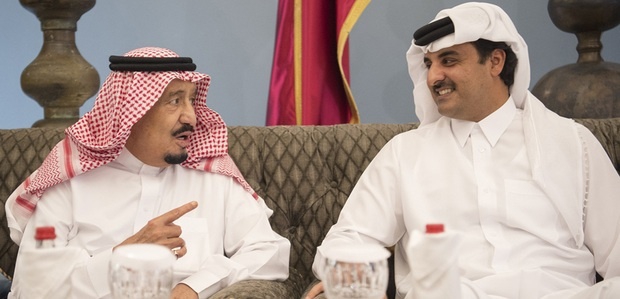Sunday 9 December 2018 - 12:28
Story Code : 329889
Why Saudi king invited Qatari Emir to Riyadh summit?
The media outlets have reported that the invitation was sent directly by the Saudi King Salman bin Abdulaziz for the Qatari emir to attend the meeting in the Saudi capital Riyadh.
Analysts consider the development as significant as it bears the potentials to mark a shift to the intra-Arab relations after the damaging spat of 2017 that pushed Saudi Arabia, Egypt, the UAE, and Bahrain to sever ties with Qatar and impose a sea, air, and ground siege on the small emirate. Three factors may drive Saudi leaders to review their stance on Doha.
Showing flexibility to global pressures in Khashoggi case
Assassination of prominent Saudi journalist Jamal Khashoggi at the kingdom's consulate in Istanbul in early October is the top matter that has very profoundly affected Riyadh's policy. On the one hand, the crime�s universal reflection and the massive reactions to it brought the Saudi rulers into disrepute. On the other hand, the Saudi rulers are under pressure of the American lawmakers and the European leaders to reform their policy. A number of the US congressmen have recently embarked on a motion to press Saudi Arabia to stop the four-year Yemen war. They also blast Riyadh for the continued blockade on Qatar. The French Present Immanuel Macron in a recent chat with the Saudi Crown Prince Mohammed bin Salman at G20 summit in Buenos Aires expressed worries about the prince�s behavior in the region and at home. Bin Salman is the center of blame in Khashoggi case as Western intelligence agencies conclude him the one who ordered the crime.
Now after increased pressures on the young prince, Saudis appear to choose to fine-tune their policy by showing some flexibility in their stances and also by greasing the Western, and mainly the American, palms. Qatar invitation must be read as a positive response to a Western campaign of pressure to change behavior in the region, a move that bin Salman expects to win him relaxation of the Western anger in Khashoggi case. Prince Mohammed�s involvement in Khashoggi case, Qatar crisis, and Yemen war not only has brought the Saudi foreign policy no power but also pushed it into further weakness.
Saudi Arabia worried about Qatar exit from the Cooperation Council
Yet another reason that moved Saudi King to invite Qatari Emir for the Sunday summit is Riyadh's concerns about possible pullout of Doha from the (P) GCC. These concerns are sharpened by the recent announcement of Qatar about its intention to quit the Oil Producing and Exporting Countries (OPEC) next month. On December 3, the Qatari Energy Minister Saad al-Kaabi said: �Qatar has decided to withdraw its membership from OPEC effective January 2019 and this decision was communicated.�
Saudi leaders went even more worried when the Qatari Foreign Minister on November 7 visited Iraq and told Baghdad officials the two counties along with Iran, Turkey, and Syria can set up a new regional alliance. The proposal aroused the ire of the Saudi leaders who were worried that the future will bear even further defeats in a regional competition. A new regional alliance, with Qatar on board it, will mean the continuation of the Saudi Arabian regional policy setbacks, to the frustration of bin Salman�s arrangements to increase the oil-wealthy kingdom�s regional clout. Panicked at the prospect of a regional front antipathetic to Riyadh, Saudi Arabia has invited Al Thani in a bid to prevent him from further drifting away from the Riyadh-dominated circle of Arab states.
White House efforts to preserve (P) GCC unity
On the other hand, the invitation of Qatar�s emir looks linked to the US President Donald Trump�s considerations in the region. Trump finds the Cooperation Council�s unity a must to confront Iran. From Washington's point of view gaps between the members is damaging to the US policy. Trump administration�s bid to form an Arab version of NATO bears witness to this strategy. In compliance with Trump policy, bin Salman hopes that the invitation will pave the way for a thaw with the neighboring emirate.
With all these matters in place, the Saudi move is unlikely to succeed with a consideration of a deep chasm between Doha and the Riyadh-led Arab circle. It is unlikely that Doha consider this invitation as a step towards reconciliation as the Saudi-led block is still blocking the Qatari nation. Rather, it will find the invitation highly tactical, mean to move bin Salman out of the political quagmire he is grappling with at the present time.
# Tags











